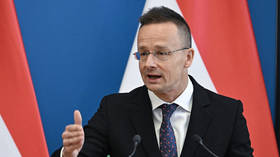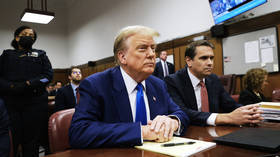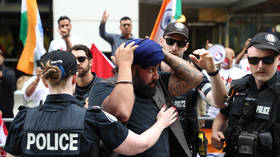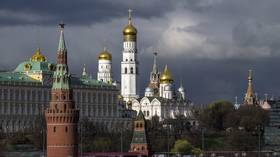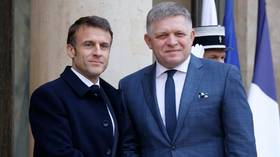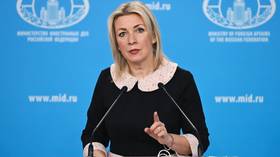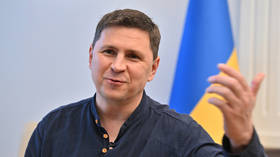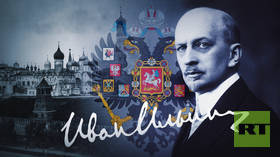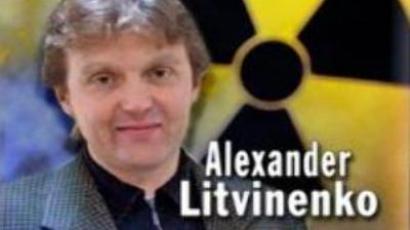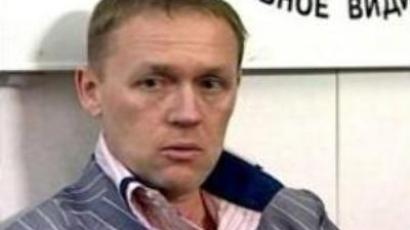Britain reveals names of diplomats to be expelled
The names of the four diplomats to be expelled from Britain have been given to the Russian Ambassador to the UK. The four have been described as middle ranking officials. The Russian Foreign Ministry is expected to issue a response within hours.
Russia has described the British decision to expel four of its diplomats over the Litvinenko affair as 'immoral'. Russia says it's unconstitutional for Andrey Lugovoy to be sent to London to stand trial, and has accused the British government of “politicising” what is a criminal case.
In a telephone conversation Russian Foreign Minister, Sergey Lavrov, told his British counterpart that Britain's move will have a serious effect on relations between the two countries.
A spokesman from Russia's Foreign Ministry, Mikhail Kamynin, told journalists that Britain's move is related to Boris Berezovsky and Akhmed Zakayev, who are wanted in Russia on terrorism charges.
The steps of official London look like a well orchestrated action and a politicising of the investigation of the so-called Litvinenko case – in which the Russian side is ready to co-operate with the British authorities to a full extent. There's an impression that by taking these steps the British side wants to justify in the eyes of the world community the refusal to work with the Russian law-enforcement institutions in the issue of extradition of Boris Berezovsky and Akhmed Zakayev to Russia, regarding whom the proof of their involvement in terrorist activities was presented. I would like to remind once again that lately the British authorities have been consistently refusing to extradite citizens of other countries that live on British territory and are accused of crimes. Against this background, as we see it, London's position is immoral. Besides, it must be understood in London that the provocative steps will not be left unanswered and may have most serious consequences to Russian-British relations as a whole.
Mikhail Kamynin,
Spokesperson,
Russian Foreign Ministry
“The steps of official London look like a well orchestrated action and a politicising of the investigation of the so-called Litvinenko case – in which the Russian side is ready to co-operate with the British authorities to a full extent. There's an impression that by taking these steps the British side wants to justify in the eyes of the world community the refusal to work with the Russian law-enforcement institutions in the issue of extradition of Boris Berezovsky and Akhmed Zakayev to Russia, regarding whom the proof of their involvement in terrorist activities was presented,” stated Mikhail Kamynin.
Meanwhile, Russia Today political commentator Peter Lavelle believes the UK's decision to expel four Russian diplomats was no surprise.
“We pretty much expected that. That was rumoured during the week-end. Four diplomats were expelled from the UK. Reciprocally, four will be asked to leave Russia. Unfortunately, these four diplomats have nothing to do with the Litvinenko affair,” he noted.
Tony Halpin, Moscow Bureau Chief of the Times newspaper thinks that London had no choice.
“If we go to the root of this particular dispute an act of nuclear terrorism took place on the streets of London. One man died a horrible death and hundreds of others were exposed to risk. After a lengthy investigation Scotland Yard and the Crown Prosecution Service believe they have identified the suspect responsible. And clearly if that person was not going to be handed over to the UK authorities the UK had no choice but to react in some manner. This is the manner they have chosen,” he said.
Speaking in Parliament earlier on Monday, Britain's Foreign Secretary David Milliband said that Russia's refusal to extradite Mr Lugovoy is 'extremely disappointing'.
“The Russian authorities have given no indication of a willingness to work with us to address this question,” he said.
“First, we will expel four Russian diplomats from the Russian embassy in London, we shall review the extent of our co-operation with Russia on a range of issues. And as an initial step, we have suspended visa facilitation negotiations with Russia and made other changes to visa practice,” Mr Milliband added.
Also, Britain is going to seek promises from its European partners that if Andrey Lugovoy travels abroad from Russia, he will be extradited to Britain.
Earlier, Russia offered to try Mr Lugovoy in Moscow, provided it gets enough evidence from British prosecutors. However, the UK maintains that because the murder was carried out in London, the case should too be closed in London. In this respect, Mr Milliband said the fact that the Russian Constitution forbids extraditing its own citizens, should not be in the way.
“It is not a unique situation, and other countries have amended their constitutions,” he noted.
David Milliband's statement was broadly welcomed by the MPs. There are people in Britain, though, who argue this is not the wisest decision that could have been taken by the Foreign Office. They also say that Britain needs Russia as a partner, especially now given the fact that economic ties between the two countries have never been that strong.
“We want the best possible relationships with Russia. We want to work together with Russia constructively on all the major international issues that we face. And we are grateful for all the opportunities that we have to work with Russia. We believed that there should be co-operation from the Russian authorities. The co-operation is not being forthcoming. With that we have to take the action that we have taken, and of course we hope that we will have the resolution of these issues very shortly,” said Gordon Brown, British Prime Minister.
Konstantin Kosachev, the head of the Duma's Foreign Affairs Committee, says that the UK officials should help the Russian investigation into the Litvinenko case, instead of playing political games.
“The British authorities are playing an absurd game. If they wish to solve a criminal case, Litvinenko's murder, the only thing they should do it to hand over to the Russian side the entire amount of evidence and to convince the Russian authorities to investigate this affair. I'm sure there's no nor can there be any delay on the Russian territory.Instead of that the British authorities become hysterical and simultaneously take steps that just don't leave the Russian side any room for maneuver. Our actions are absolutely predictable. We are not going to disobey our own Constitution in order to advance political relations with any country whatsoever, and certainly, we are not going to tolerate the situation. As far as I can remember there were no case records when diplomats were expelled from some country or other as a contribution for bad relations. The UK is clearly violating its own international commitments under the 1961 Vienna Convention on Diplomatic Intercourse. And it is clear that in this situation Russia's reply can only be the same, only the symmetrical one, only the mirror-like one, certainly, a prompt one,” Mr Kosachev explained.
“In this situation we must show to the rest of the world that we are able to perfectly defend our interests and positions by legal means, and that we can as perfectly, as promptly and as toughly defend our interests by practical actions without allowing any hurts to Russia,” he stressed.
Just days before his death, Aleksandr Litvinenko became somewhat of a household name. The former Russian security officer had fled to Britain in 2000, claiming he feared for his life.
In November last year, he checked himself into a London hospital. Traces of the radioactive element polonium- 210 were found in his body.
His death caused a scandal, with cold war rhetoric ringing throughout the UK.
A murder investigation was opened, and British authorities later identified their main suspect as Andrey Lugovoy.
Over the last six months we have spoken to Scotland Yard many times – both me and my helpers who speak better English than me – we sent a request to the Crown Prosecution Service so that we could combine efforts and co-operate with them but they did not even respond. Thus the British side lies, saying they have been carrying out an unbiased investigation, and as I see it, British justice ends where political reasons step in.
Andrey Lugovoy
Mr Lugovoy, another former security service officer who had met with Litvinenko on the day he was poisoned, had been co-operating with investigators as a witness. But later his status was changed, becoming a chief suspect.
In this respect, Mr Lugovoy said he would not be made a scapegoat by the authorities, blaming Scotland Yard for political bias when dealing with this case.
“Over the last six months we have spoken to Scotland Yard many times – both me and my helpers who speak better English than me – we sent a request to the Crown Prosecution Service so that we could combine efforts and co-operate with them but they did not even respond. Thus the British side lies, saying they have been carrying out an unbiased investigation, and as I see it, British justice ends where political reasons step in,” stated Andrey Lugovoy.
An extradition case heating up a row between Moscow and London is not something unique. World countries have different policies on extradition.
“Most countries in the world don't hand over their citizens. In this particular case, facts have to be checked under both the Russian and the British legal systems. And if Russia doesn't think the other side's arguments are convincing enough, of course it refuses to extradite its citizen,” believes Aslan Abashidze, from Russian Association of Assistance to UN.
Russia doesn't stand alone. Six years ago, Badri Patarkatsishvili, a well-known Georgian businessman was wanted on criminal charges by the Russian authorities. He was often linked with the oligarch-in-exile Boris Berezovsky. But the Georgian Prosecutor General's Office refused to hand him over.
“Formally, the law provides for the Georgian government to extradite a Georgian citizen abroad, but first of all, a decision must be made by the Prosecutor General, and then the Georgian citizen in question has the right to appeal. I can't recall any case when a Georgian was extradited to European or any other country to stand for a trial,” explains Giorgi Chkheidze, Chairman of the Young Lawyers' Association of Georgia.
Others insist they don't want to become safe havens for criminals.
“There were people extradited to France, to America, to England, if I'm not mistaken. There are people extradited. Israel is definitely not an asylum for criminals even if they are Jewish,” claims Hanan Gold, Israeli lawyer.
For its part, Moscow is pointing the finger back at London. The Prosecutor General's office says since 2002 it's been seeking the extradition of 21 people from the UK, on charges including murder, terrorism and money-laundering. None have been handed over.
Among them – a prominent tycoon Boris Berezovsky and his business partner Yuli Dubov, and Ahmed Zakayev – a Chechen militants' envoy – all granted asylum by the British government.
The Russian Prosecutor Generals' office says over the past years Great Britain has become one of the favourite destinations to escape responsibility for crimes committed on Russian territory. Moscow accuses London of double standards.
Meanwhile, the story has topped Tuesday's British press headlines. The general consensus is that Britain's Foreign Office is rightly putting pressure on stubborn Russia to put the alleged murderer on trial, as RT's London correspondent Dariya Pushkova reports. The UK media puts the blame on Russia, saying it forced Britain to take such harsh measures. It also supports Gordon Brown's call for Russia to amend its constitution.


